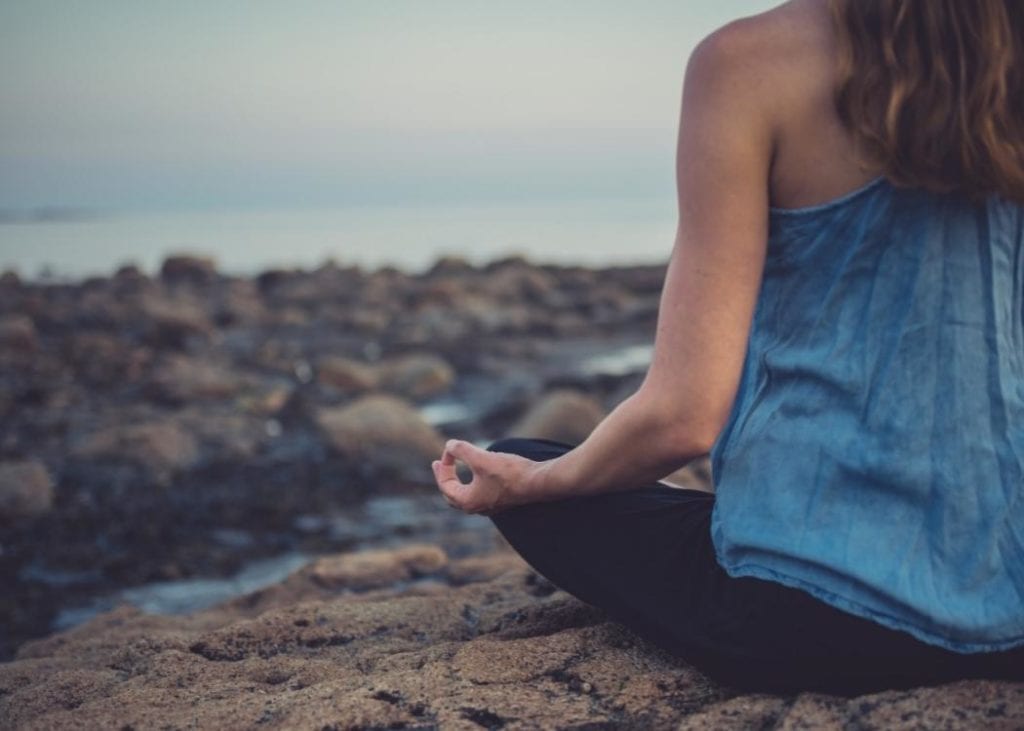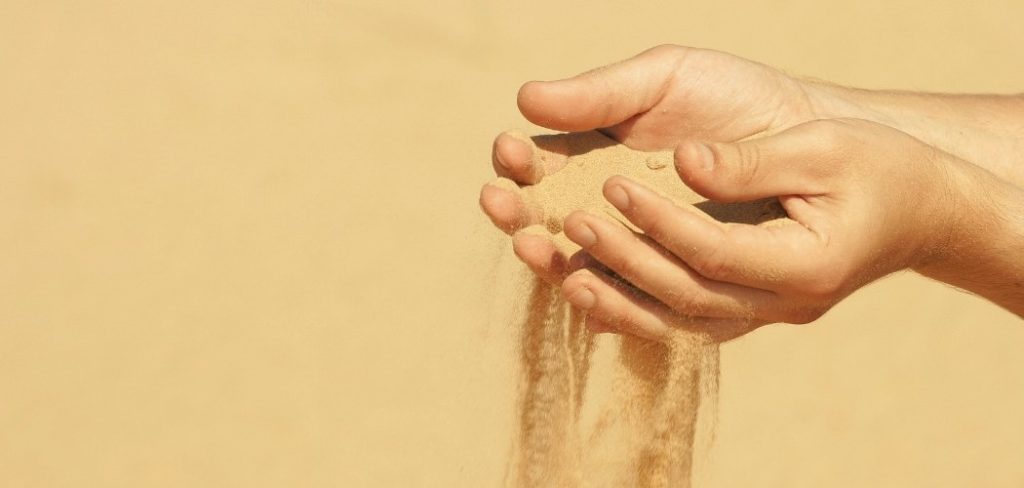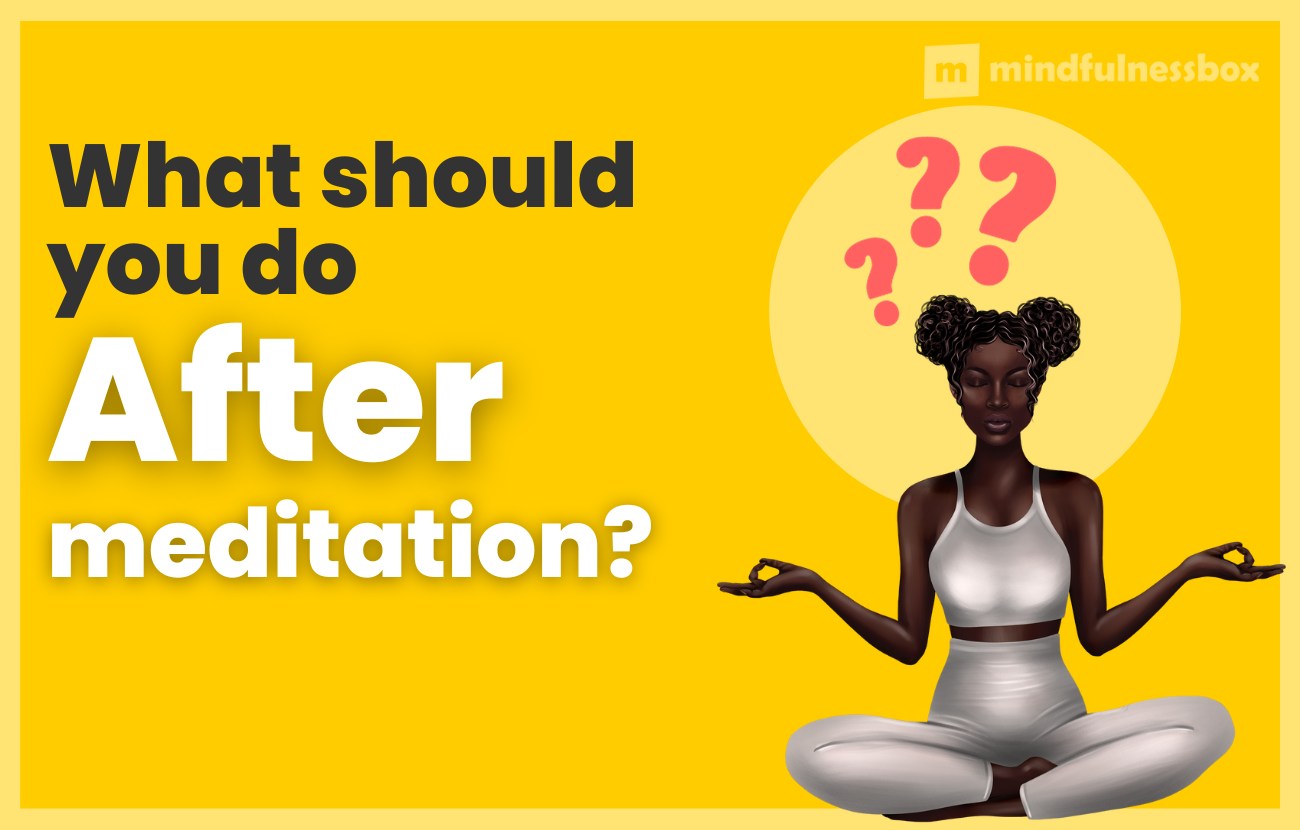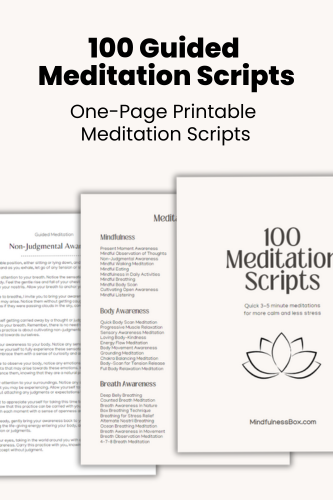The best thing to do after meditation is to continue to sit for a bit longer, processing your experience and maintaining a state of calm. If you have time, move on to an activity that supports your mindfulness, like journaling to consolidate the progress you have just made, or walking meditation.
You might be wondering what to do after meditating.
These 100 meditation scripts were created to help beginner and intermediate meditators practice key mindfulness concepts like self-love, forgiveness, gratitude, and inner peace.
Designed to fit into busy schedules, each meditation script lasts 3-5 minutes. Perfect for starting or closing a group meditation; for yoga, coaching, or therapy sessions; or for your personal meditation practice.
You might be relieved that your meditation session is over and ready to get on with your day. That can happen, especially with a challenging session. Or, you might be in a state of bliss and calm, hoping desperately to bring that feeling into your daily life.
Often, meditators feel like there must be some way to better hang on to the calm they felt during their meditation session. It can feel frustrating to lose that.
Let’s review some options for what to do after meditation, as well as explore how to keep the “feeling” of meditation alive for longer in your daily life.
What Should I Do After Meditation?
These steps guide you through how to think about your post-meditation experience in three chapters: immediately after meditation, 30 minutes later, and long-term.
1. What to do immediately after meditation
Immediately after meditation, try to avoid getting up and doing something right away.
Instead, ask yourself: what do you feel after meditation? Try and provide a few minute long transition period to ease yourself back into reality.
Your mind will start moving on from the experience of observing itself and will get on with things the mind does: looking at the past and the future. You might start thinking about the things you need to do during the rest of the day.
Acknowledge these thoughts, but gently practice releasing them. Promise your brain you’ll get back to them shortly. The opportunity you have directly after meditation, once your eyes are open and your brain is churning again, is to get one extra bit of practice at pulling yourself back to the present in a more “real life” setting.
2. First 30 minutes: How to keep the good vibes going

After sitting for a few minutes to transition out of your meditation experience, consider moving towards a mindful activity if you have the time. If you have a positive feeling after meditation, this can help keep it going.
Journaling, mindful walking, being in nature, or simply continuing to sit quietly are all good options.
By continuing to immerse your mind in an environment and activity that you’re approaching with intention, you’re getting additional practice at staying present, and you’re doing so in a quieter environment where you might find it easier to catch your thoughts drifting to the past or present.
You’re also extending the transition period between meditation and any obligations that may be awaiting you in the world.
3. Long-term: How to feel the effects of meditation for longer

It’s frustrating to get dumped right back into a noisy and chaotic world after a meditation experience that made you feel like something had changed.
Unfortunately, that’s the way it works with meditation.
The way to feel the effects of meditation for longer is to continue your practice for months and years. You may find that your progress is imperceptible until one day, you realize something’s different.
However, even if you’re early in your meditation journey, you can make life easier by changing how you perceive your “failures.” Rather than feeling discouraged when you leave a meditation session and find yourself quickly back in old habits, living in the past and future instead of the present, recognize one thing:
You’re noticing that your mind is in the present or past. You’re noticing that your mind is judging. Is that something you would have done before observing your mind through meditation?
The mere acting of noticing when our thoughts take us away from the present moment is already a win.
If you’re not frequently catching yourself slipping away from mindfulness in your daily life, you may also try setting a few reminders on your phone. This can help you continue to build a habit to be present as you go about your day.
Why good feelings from meditation slip away so quickly

Maybe you’ve sustained a calm and centered feeling after meditation by sitting silently for a few moments after your session. And maybe you’ve managed to hang onto it longer by staying in a peaceful frame of mind by journaling or taking a mindful walk or spending time in nature.
But chances are, after this brief period of calm, you’ll revert to your “normal” way of being.
Many of us feel like this:
“After I meditate and open my eyes, it feels wonderful, like I’m “high” in a way. However, this state of bliss then rapidly dissipates, and I always find myself back in my default-state after just a few minutes. Has this been anyone else’s experience? Am I making progress?
Frankly, I’m concerned that I’m not making progress. I feel like, the way I practice, meditation gives me temporary relief, but it just goes away so quickly. It’s as though my stressed, anxious mind floods back in.
I’d love to cultivate a more perpetual state of mindfulness, which I believe I glimpse in some people, such as Jon Kabat-Zinn (reading his book now) or Eckhart Tolle. But it feels like I’m somehow doing it wrong–that nothing is building up.”
One meditator’s experience from https://www.reddit.com/r/Meditation/
This can be a discouraging feeling, but it’s totally normal.
Meditation is a practice, and during your meditation sessions, you’re practicing bringing your brain back to the present moment.
But your brain has much, much more practice living in the past and the future. Your brain is better at ruminating than it is at being present.
In scrambling for lessons from the past and worrying about threats that might be coming in the future, your brain is trying to help you survive.
Remember that you’re also fighting against human nature as you try to stay present.
What should you not do after meditation?
There are no real rules for what not to do after meditation.
Ideally, it would be nice to keep yourself in a peaceful environment, avoiding chaotic places and hectic activity.
But in truth, meditation isn’t meant to be a relaxing practice. It is simply a practice to help us be more mindful and present and nonjudgmental during the course of the rest of our life.
So if you meditate and then jump straight into a work meeting or run off and do errands, there’s no reason you can’t get the same benefit out of the practice.
And in the long run, there’s no reason you can’t maintain mindfulness in any environment.
Measure your meditation progress in years, not days
Immediately after meditation, hold and savor the experience by sitting a bit longer, and if you have time, moving to a journal or a mindful walk.
After that, you will likely feel clear and present for a brief time, then swing back to your mode of being in the world.
Meditation progress is slow, and your best bet is to change the way you measure.
Most of us are distracted 46.9% of the time. Your job with mindfulness is to get that number down. It takes time.
Change how you’re measuring, and change your time scale.
Measure your meditation progress in increments. It’s not whether you are mindful or not. It’s “are you being mindful a higher percentage of the time?”
Measure the change in you meditation practice in years, not weeks.
It’s not whether you are doing better today than yesterday. It’s “are you remembering to be nonjudgmentally aware more often than you did a year ago?”
Frequently asked questions
Can you sleep after meditation?
Yes.
Feeling tired after meditation is normal. If you are able, you may choose to sleep afterwards, but you may want to do so in a place that’s different than where you were meditating, so you don’t start to associate your meditation spot with sleep. There are also meditations that exist for the express purpose of helping you fall asleep.
Can I eat after meditation?
Yes.
There are no reasons not to eat after meditating, however, it’s up to your personal preference. However, many traditions recommend not eating before meditation, as a meal can cause discomfort and possibly make you more drowsy. A gap of one hour after eating is recommended before meditating. Eating a light meal is okay.

My mindfulness practice kicked off in 2016 with a ten-day silent retreat. Since then, I’ve read dozens of books about mindfulness and completed hundreds of hours of meditation. Thinking about what makes humans happy, calm, and peaceful is endlessly fascinating to me.


